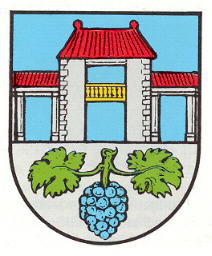Schweigen: Difference between revisions
Jump to navigation
Jump to search
Knorrepoes (talk | contribs) m (Text replacement - "/Arms of " to "/Arms (crest) of ") |
Knorrepoes (talk | contribs) m (Text replacement - "{{media}}" to " {{de1}} {{media1}}") |
||
| Line 25: | Line 25: | ||
Viticulture is very important for the village, which is shown by the grapes in the lower half. The upper half symbolises the 'gate to the German wine-road', as this (touristic) road starts in the village. | Viticulture is very important for the village, which is shown by the grapes in the lower half. The upper half symbolises the 'gate to the German wine-road', as this (touristic) road starts in the village. | ||
{{ | |||
{{de1}} | |||
{{media1}} | |||
[[Civic Heraldry Literature - Germany|'''Literature''']]: Debus, 1988 | [[Civic Heraldry Literature - Germany|'''Literature''']]: Debus, 1988 | ||
Revision as of 11:35, 26 December 2022
This page is part of the German heraldry portal Deutsche Wappensammlung |
Heraldry of the World |
|
German heraldry:
|
Selected collector's items from Germany:
|
SCHWEIGEN
State : Rheinland-Pfalz
District (Kreis) : Südliche Weinstrasse
Verbandsgemeinde: Bad Bergzabern
Incorporated into : Schweigen-Rechtenbach
| German | Von Blau und Silber geteilt, oben ein rotbedachtes silbernes Tor mit goldenem Steg, mit einem beidseits anschließenden niedrigeren rotbedachten silbernen Anbau, unten eine grünbestielte und -beblätterte blaue Traube. |
| English | No blazon/translation known. Please click here to send your (heraldic !) blazon or translation |
Origin/meaning
The arms were officially granted on February 22, 1939.
Viticulture is very important for the village, which is shown by the grapes in the lower half. The upper half symbolises the 'gate to the German wine-road', as this (touristic) road starts in the village.
Literature: Debus, 1988


